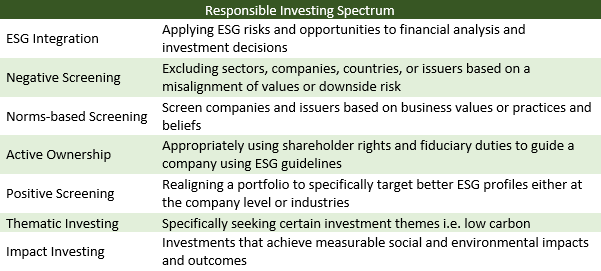New rating system set to separate leaders from ‘greenwashers’
Environmental, social and governance (ESG) considerations are becoming an increasingly important discussion point for advisers and investors alike. This was evidenced by the substantial turnout at the Inside Network’s inaugural ESG Masterclass last week. Rarely does a week go by without another product being issued, or scandal occur. The sector remains difficult to navigate, with a significant amount of data around, but few offering simple tools to support investment decision makers, until now.
Investment consulting business Evergreen Consultants has developed its own Responsible Investing rating system called the Evergreen Responsible Investing Grade Index (ERIG Index), available within Green VUE. This is Evergreen’s proprietary reporting and portfolio analytics tool that is offered to its clients, and is used to access internal funds and asset allocation research, as well as reporting and analytics.
The index is a grading system that grades a fund manager based on its intent and actions, not just its stock-picking abilities. ERIG uses a “survey-based top-down assessment” that eliminates “greenwashing,” or where a company spends money claiming to be green through marketing, but its actions don’t necessarily stack up. The index does this by evaluating the depth and breadth of a manager’s actual process (actions), with recognition of the alignment to its beliefs about responsible investing (intent).
Evergreen Founder and CEO Angela Ashton says “a portfolio with a certain sustainability score does not necessarily mean the manager is a responsible investment manager. It is a necessary, but not sufficient, condition to prove the style. We look at what the manager does and compare this to others in the marketplace.”
The ERIG Index looks at seven categories, being ESG integration, negative screening, norms-based screening, active ownership, positive screening, thematic/sustainable investing and impact investing, and assesses which of these capabilities the manager offers, how good or bad it is in each, and grades each category.

What’s involved?
- A fund manager will complete a questionnaire covering the Responsible Investment Association Australasia’s (RIAA’s) seven categories.
- The questionnaire will touch on the manager’s high-level beliefs about each RI capability it offers and the depth and breadth, strengths and weaknesses of its approach.
- It will also use the UN-backed Principles for Responsible Investment (UN PRI), which has a framework for selecting investment managers.
- Manager grades are updated annually unless a significant change requires a review;
- The survey will be completed on a regular basis to identify any major changes.
Any fund can be rated on the index and it’s done using a top-down approach – “How the fund manager applies responsible investing to its fund.” This is different to the traditional approaches which use a bottom-up approach.
That is; the rating system will look at each company and score accordingly. Ashton says she “doesn’t think this is ideal,” as it gives an average score and isn’t a good representation. There are roughly 160 companies that have ratings. Some companies do it well, and others do it poorly. The result can be misleading.
Instead, Ashton’s process digs into the detail. It looks at what the fund manager does, and ensures it is actually doing what it says it’s doing. Using this type of approach ensures a fund manager’s processes will lead to proper responsible investing. Ashton says the consultancy found a lot of ESG or responsible investment (RI) branded funds that were not.
Ashton also says impact investing is an area in which “hardly any fund managers score well.” But in a good sign, she says, fund managers are taking ESG more seriously because their clients are becoming more and more green-oriented. Currently, Evergreen is surveying 180 funds for the Index.










